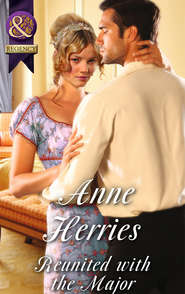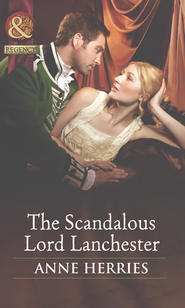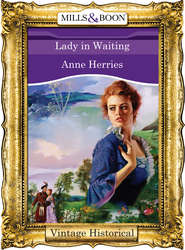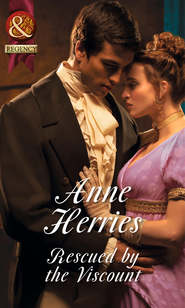По всем вопросам обращайтесь на: info@litportal.ru
(©) 2003-2024.
✖
Chosen by the Lieutenant
Настройки чтения
Размер шрифта
Высота строк
Поля
Mama said ladies needed a husband to provide them with children and a good home, but after that it was sensible to find one’s own interests and leave the gentlemen to pursue whatever course they chose.
‘Oh, you foolish, foolish girl,’ Amanda said to her reflection and amusement lit the grey eyes. ‘To be hankering after a man just because he is kind and always thinks of your feelings. It is ridiculous and you should put him right out of your mind. He may be kind, but he is not in love with you.’
How could he be in love with the girl she’d seen in her mirror? No man wanted a dumpling as his wife—especially one as tall and handsome as Phipps. She was an idiot to think about it and must accept that she would probably be an old maid and stay at home to look after Papa—and he would not mind at all.
Amanda felt better and laughed, her face lighting up as she saw the funny side of her predicament. Lieutenant Phipps was in financial difficulty. She had always known that as a second son he would inherit only a small estate from his grandmother, which was situated not more than sixty miles from Papa’s estate, and his younger son’s portion from his father. If he wished to continue the lifestyle he so clearly enjoyed, visiting the clubs and mixing in society, he must marry an heiress. So why not her?
‘Because you are fat,’ Amanda told her reflection severely. ‘If you were not so greedy, you would be like a waif and he would fall in love with you!’
She must renew her efforts to lose weight. Always her own worst critic, Amanda told herself off regularly, and indeed, she did try, but when one went to so many parties and was offered such delicious trifles, it was so hard to refuse. Besides, even if she did manage to lose weight, she could never look like the beautiful Miss Cynthia Langton. Lord Langton’s daughter was the latest heiress to come to London and was quite the haughtiest of all the beautiful young ladies this Season. Most of the unattached gentleman had flocked to her train and Amanda had seen several young ladies give her glances that, had they been daggers, would undoubtedly have slain the new arrival.
Strangely, Miss Langton had taken a fancy to Amanda. She did not have many female friends, even though her cousins Sara and Jennifer were in town and included her in their party as a matter of course. However, Amanda had been of assistance to the beauty when a flounce on the hem of her expensive Paris gown had been torn. Always equipped with a needle and thread at parties, Amanda had advised her of the tear, taken her into a private salon and repaired it so neatly that no one could see it had ever been torn. Miss Langton had attached herself to her saviour at every possible occasion after that, calling her my dearest Amanda and begging her to call her Cynthia.
Thus, Amanda was always invited to any parties her friend’s family gave, was invariably taken on all the outings to theatres, to Vauxhall and the park for a balloon ascension, to every picnic, every drive to Richmond and all the balls, routs or fêtes that Miss Langton attended. It meant that when the two heiresses entered a room together, within minutes at least half the gentlemen present would gravitate to their sides.
Amanda received her share of the attention, but she was not such a fool as not to notice the difference in the homage offered to her friend and the polite attentions given to herself.
None of which she minded at all—indeed, she drew a deal of amusement from watching the various gentlemen try first for Miss Langton’s good graces, and then, when they perceived they were not favoured, for her own. However, her mild amusement had suffered a blow recently when Lieutenant Phipps had entered the fray.
Phipps was one of many suitors the beauty kept in her train, but she did seem to favour him sometimes and that made Amanda’s heart sink. If Cynthia wanted him, she would have him, as she took anything else that caught her fancy, expecting and receiving slavish worship as her right. On the day of a ball, Amanda might expect five or six posies from would-be suitors, but Cynthia was like to receive as many as twenty. She was all the rage and the queen of the Season, and accepted the gentlemen’s homage as her right.
Amanda bore with it all patiently, for she begrudged her friend none of her success, but if Phipps made her an offer and was accepted it would break her heart...
No, how foolish! Amanda laughed at herself. She was no tragedy queen and had always known that in the end she might have to settle for second best. Only if Phipps felt drawn to her, found her necessary to his comfort, would he ever look at her as a prospective bride. It was unlikely to happen, but, since she knew that Cynthia was hoping for at least an earl, he would probably find himself dropped once the right suitor presented himself. If Amanda happened to be around at that time... She shook her head once more.
If it were not so sad, it would be most amusing. Why would the tall and handsome Phipps ever look at a dumpling like her?
Chapter One (#udeaf3bdb-ab3c-5bdb-9c1c-ba2da486a7a4)
Phipps looked through the letters on the silver salver in the hall of his family’s house in Gower Street. Half a dozen letters were waiting for him, but he judged that most of them would be polite reminders from his creditors. He was properly in the suds for the moment, because a sure thing at Newmarket had let him down and he’d lost five hundred guineas, which made it quite possible that he might have to leave town soon for lack of funds.
He was a damned fool, of course. Phipps glanced at his reflection in the gilt-framed mirror on the wall. His father had warned him to mend his ways and he’d managed it for a few weeks, because there was no point in applying to Lord Piper for extra funds when he knew full well that that gentleman was having trouble balancing the books on his own account. Phipps’s elder brother, Alexander, was quite as expensive as Phipps himself and, had he not inherited a large estate from his grandfather, would doubtless have bankrupted his father. However, despite his fortune, there was not the least hope of asking Alex for a loan, for he normally exceeded even his generous income.
Picking up the letters, Phipps carried them to his desk and deposited them in a neat pile to examine when he could find the determination to tackle the situation. Had he last week come across an earlier pile of debts that had escaped his notice, he might never have placed that reckless bet.
Oh, well, there was no point in dwelling on the mess he was currently in. He must find some way of extricating himself from a pit of his own making. It was not a new situation; he’d always known that as the second son his affairs must trail behind those of the heir. It was the way in all good families, where the estate was entailed. Besides, Phipps knew that his elder brother outshone him in so many ways. Had he been a brilliant scholar he might have made his way in Parliament, but he had little taste for such a life and had joined the army, spending several happy years serving under Wellington. His career had been solid, but without the lustre of having distinguished himself by dying in a death-or-glory charge and instead escaping virtually unscathed. Had he only been able to wear his battle scars with pride, he might have occasioned more of a stir, but he was merely one of many brave officers who had done their duty.
How he was to make a distinguished career now that the wars were over, at least for the time being, he could not say. An officer in peacetime spent most of his life lounging around or parading his men for want of something better to do, which led to boredom and quite often excessive gambling or drinking. Phipps’s father might well demand some improvement in his situation—but how? Phipps knew that in his father’s eyes he was a disappointment, for which he felt deep regret, but it was not easy to match up to a brother who bestrode the world like a young god.
Calling for his valet to lay out his evening clothes, Phipps went into the dressing room to wash and shave. Maggs had put out his shaving things and there was warm water in the blue-and-white bowl. He was a good man and had served with Phipps in the army throughout the troubles with Napoleon.
It would be a huge wrench to let the man go, as it would his grooms—and his horses...
Lord! Surely things were not as bad as all that? Phipps felt slightly sick as he remembered that the sum of his debts was almost five thousand pounds. How had he allowed them to mount to such a sum?
Of course there was the generous wedding gift of silver for Jack and Charlotte’s wedding...but that only accounted for a few hundred guineas. Letting his thoughts drift away for a few minutes, Phipps remembered how happy his friend had been on his wedding day. He’d stood as Jack’s best man and it had been a real pleasure to make that speech and see the delightful pair emerge from church...of course Charlotte was beautiful.
Most of his particular friends were now either married or engaged, Phipps reflected as he scraped the soap from his chin, studying his face in the mirror Maggs had set for him. Phipps supposed marriage might be the answer to his problems, though he would have preferred some other way of settling his debts. It was rather demeaning to offer for an heiress, knowing that at some time soon after the wedding one would have to dip into her fortune to settle his wretched affairs. Although in theory a woman’s fortune became her husband’s on marriage, there was normally a contract securing an income to her and the most part of the capital to her children. To stipulate that a large portion be allotted for his personal use would make Phipps feel like a beggar.
Besides, having once offered for a lady he had believed to feel some affection for him and whom he had loved in return, only for her to marry a rich man twice her age, he was apprehensive of making an offer to any lady.
What had he, a mere second son, to tempt any lady of fortune?
Phipps had delayed looking seriously for a bride for months. Had he been able to find some gainful employment he would surely have done so before this, but it was not easy. He’d offered his services to Lord Piper, but his father had good agents and did not trust him to replace them. His army pay in peacetime was scarcely enough to keep him in boots and certainly not enough to set up a family.
Unless he could find employment as an estate manager—or perhaps a political secretary?—he must marry an heiress, Phipps admitted with a deep sigh. The devil of it was that he knew of only two who were likely to look on him with favour and were rich enough not to bother that he needed a large sum almost immediately.
Miss Cynthia Langton and Miss Amanda Hamilton: one beautiful and proud, the other a pleasant little dumpling who might have been passably pretty had she been a stone lighter.
He had formed a part of their court for the past two months or more. Miss Hamilton was always to be seen with her beautiful friend, which meant that most of Miss Langton’s suitors ended up sitting at her side and talking to her, quite often of her friend’s beauty. Phipps had found himself relegated to that position less often than most, for, wonder of wonders, Miss Langton seemed often to smile on him. She would accept a cup of iced lemonade from his hand, allow him to dance with her twice at balls, take her walking in the park—with Miss Hamilton and another gentleman—take her driving to various places of interest, with Miss Hamilton following behind in the curricle of another gentleman.
Had Miss Langton been less beautiful and not so universally admired, Phipps would probably have offered for her long ago, but he doubted that she would take him. Her fortune was sufficient not to look for it in her husband, but she did look for rank and it all came back to the fact that Phipps was a younger son. His brother Alex was just a year older and in the best of health, which meant that he had no hope of ever stepping into his shoes—nor would he wish to since it would mean his brother’s demise. They might not be bosom friends, but were fond enough as a rule.
Only by making a distinguished career for himself could he hope to engage the interest of a lady wealthy enough to pay his debts and keep them both in the luxury he and she would enjoy.
Phipps looked himself squarely in the eyes and admitted the truth. Miss Langton might flirt with him, she might encourage him to dangle after her, but she would not marry a younger son with few prospects.
Which left him with the alternative. Miss Hamilton might not be a beauty, but she had many fine qualities: a sense of humour, a ready mind and a generous heart. In short, Phipps liked her, but that was a part of the problem. He knew that he was not in love with either of the heiresses. He did not know of a lady who made him want to die for love of her, to swoon at her feet or fight to protect her. There had been that one unfortunate experience, when he was a green youth, but that had taught him to look beneath the surface, if one did not wish to be burned.
Indeed, rather like his friend Jack, he’d thought that romance was grossly overrated. A man should look for comfort in his home and take a beautiful mistress for his other needs. Given this, it hardly mattered what this proverbial wife looked like, providing she was good-hearted.
So, why had he not asked Miss Hamilton to marry him weeks ago?
Phipps was not a vain man, but he knew that her smile lit up her eyes when he went to sit next to her and she always seemed happy to dance with him—so why not ask her to be his wife? He was pretty sure she would take him if he asked.
A rueful grin touched his mouth. His wretched sense of honour had made him hold back. She might not be beautiful, but she was a thoroughly nice girl and it would be wrong to take advantage of her good nature. Had she been in need of protection from the fortune-hunters, Phipps might have persuaded himself that by asking her he was protecting her from men who would run through her fortune in a year and treat her abominably. He himself would do no such thing. If she gave him her hand, Phipps would do all he could to make her happy and try to increase her fortune—but would it be enough?
She was entitled to be loved for herself. Phipps was too honest to lie, and to admit that he would marry her because he could see no other way out of his debts would be to insult her. She did not deserve to be so shabbily treated! He believed that more than one unscrupulous fellow had already made the attempt and been sent away with his hopes dashed.
Phipps would find that extremely humiliating!
Suddenly, the funny side of it struck him. He could not insult Miss Hamilton by asking her to wed him, and, though he might attempt Miss Langton, he believed his efforts would be doomed to failure.
No, he must simply make some economies. Perhaps if he sold both his horses and his commission, and returned to the country for a few months he would come about—and who knew, he might fall in love with a girl who just happened to be rich. Jack had fallen in love despite the odds, why not Phipps?
He had no time to dwell on his problems now, for he was engaged to Brock for an evening at his house: dinner, cards and music was promised and it would be a popular event, for Lord Brockley’s elder son was much sought by hopeful mamas, though they hunted in vain. Brock was an avowed bachelor and had recently won a large bet with Jack Delsey over which of them would marry first.
Brock’s aunt was hosting the party at his large town house that evening. She was a cheerful, hearty widow who laughed loudly and resembled a horse, but was a good sort who neglected nothing in the comfort of her guests.
Emerging from his dressing room clothed in shirt and evening breeches, Phipps allowed his valet to help him struggle into a velvet coat that fit like a second skin. His hair combed into a style that was known as windswept and suited his dark locks to perfection, he allowed his valet to hand him snowy-white cravats that he then, by dint of lowering his chin, formed into perfect creases. It was not quite a waterfall, Phipps thought, but a very creditable arrangement of his own design and beginning to be followed by the young dandies that desired to be all the crack.
As he thanked his man, then left for the evening, Phipps thought that he might sell his commission. The sum it raised would not settle his debts by a long way, but he might pay the most pressing and then perhaps some clever ploy would present itself.
Phipps did not cast a look towards the small pile of letters awaiting his attention. Time enough for that tomorrow...
* * *
Amanda saw Lieutenant Phipps enter the salon. She and Miss Langton had positioned themselves on a small sofa at the far end of the room so that they might see the guests as they arrived and also be seen. However, the room had filled up considerably and their view was sometimes blocked by ladies and gentlemen lingering to talk in the centre of the room.











